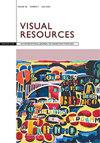“Rootless Cosmopolitans”? Visual Resources, an International Journal in Nationalist Times
IF 0.1
0 ART
引用次数: 0
Abstract
A few months before I wrote this editorial, Theresa May (b. 1956), Prime Minister of the United Kingdom, delivered an anti-immigration speech at the 2016 Conservative Party Conference, expressing her solidarity with British citizens who found themselves “out of work or on lower wages because of low-skilled immigration.” Britain, May believed, should principally look after its own citizens and its own communities. She continued, with a logical non sequitur that has been widely criticised in the press, by stating: “citizens of the world are citizens of nowhere.” In October 2016, May’s government had just begun the process to leave the European Union following the result of the 23 June 2016 referendum, a marginal victory for the “Leave” faction (who gained 51.89% of the votes), which has been widely interpreted as a vote of protest against immigration. May’s outburst against the “citizens of the world” was widely taken as a xenophobic comment against a progressive, utopian vision of open borders, cosmopolitanism and internationalism. Meanwhile Donald Trump (b. 1946), current President of the United States of America, still aimed to keep his electoral promise to build a “wall” to separate the country from Mexico and thus to prevent immigration, specifically by non-whites. In 2017, as happened before in the course of the twentieth century, political factions principally connected with the far right have appeased popular unrest about the continuing financial crisis by blaming immigration. This intolerance has manifested – practically – into a bureaucratic and political cull of immigration and – culturally – by voicing concerns against the intellectual notions of internationalism and cosmopolitanism themselves. The Heritage Foundation, an American right-wing think tank, writes: “the immigration crisis in America is the physical manifestation of our nation’s intellectual confusion. The growing influence of dogmatic cosmopolitanism and multiculturalism has caused chaos in the public mind, which is reflected in the chaos we see on the ground.” The current words of the writers of the Heritage Foundation echo the Stalinist criticism of the “rootless cosmopolitan,” a pejorative label widely used both in anti-Semitic and anti-Western campaigns in the Soviet Union in the 1940s and 1950s. The Russian satirical periodical Krokodil published a caricature of the “rootless cosmopolitan” (Figure 1) in March 1949. A travelling writer, with caricatured Jewish features, is described negatively as a “passportless drifter” for whom writing is a weapon: he wears“无根的世界主义者”?民族主义时代的国际期刊《视觉资源》
在我写这篇社论的几个月前,英国首相特蕾莎·梅(生于1956年)在2016年保守党大会上发表了一篇反移民演讲,表达了她对那些发现自己“因低技能移民而失业或工资较低”的英国公民的声援,应该主要照顾自己的公民和社区。她继续说道:“世界公民是无处可去的公民。”2016年10月,在2016年6月23日公投结果出来后,梅政府刚刚开始脱欧进程,这是“脱欧”派(获得51.89%的选票)的微弱胜利,这被广泛解读为对移民的抗议投票。梅对“世界公民”的爆发被广泛认为是对开放边界、世界主义和国际主义的进步乌托邦愿景的仇外言论。与此同时,美利坚合众国现任总统唐纳德·特朗普(生于1946年)仍然致力于履行他的选举承诺,修建一堵“墙”,将美国与墨西哥隔开,从而防止移民,特别是非白人移民。2017年,正如20世纪以前发生的那样,主要与极右翼有联系的政治派别通过指责移民来平息民众对持续的金融危机的不安。这种不容忍实际上表现为对移民的官僚和政治筛选,并在文化上表达了对国际主义和世界主义思想本身的担忧。美国右翼智库传统基金会写道:“美国的移民危机是我们国家知识混乱的具体表现。教条主义世界主义和多元文化主义的日益增长的影响在公众心中造成了混乱,这反映在我们在当地看到的混乱中。”。传统基金会作家们现在的言论呼应了斯大林主义者对“无根世界主义”的批评,这是一个贬义标签,在20世纪40年代和50年代的苏联反犹太主义和反西方运动中都被广泛使用。1949年3月,俄罗斯讽刺杂志《Krokodil》发表了一幅“无根世界主义者”的漫画(图1)。一位具有讽刺犹太特征的旅行作家被负面地描述为“没有护照的流浪者”,对他来说,写作是一种武器:他穿着
本文章由计算机程序翻译,如有差异,请以英文原文为准。
求助全文
约1分钟内获得全文
求助全文

 求助内容:
求助内容: 应助结果提醒方式:
应助结果提醒方式:


